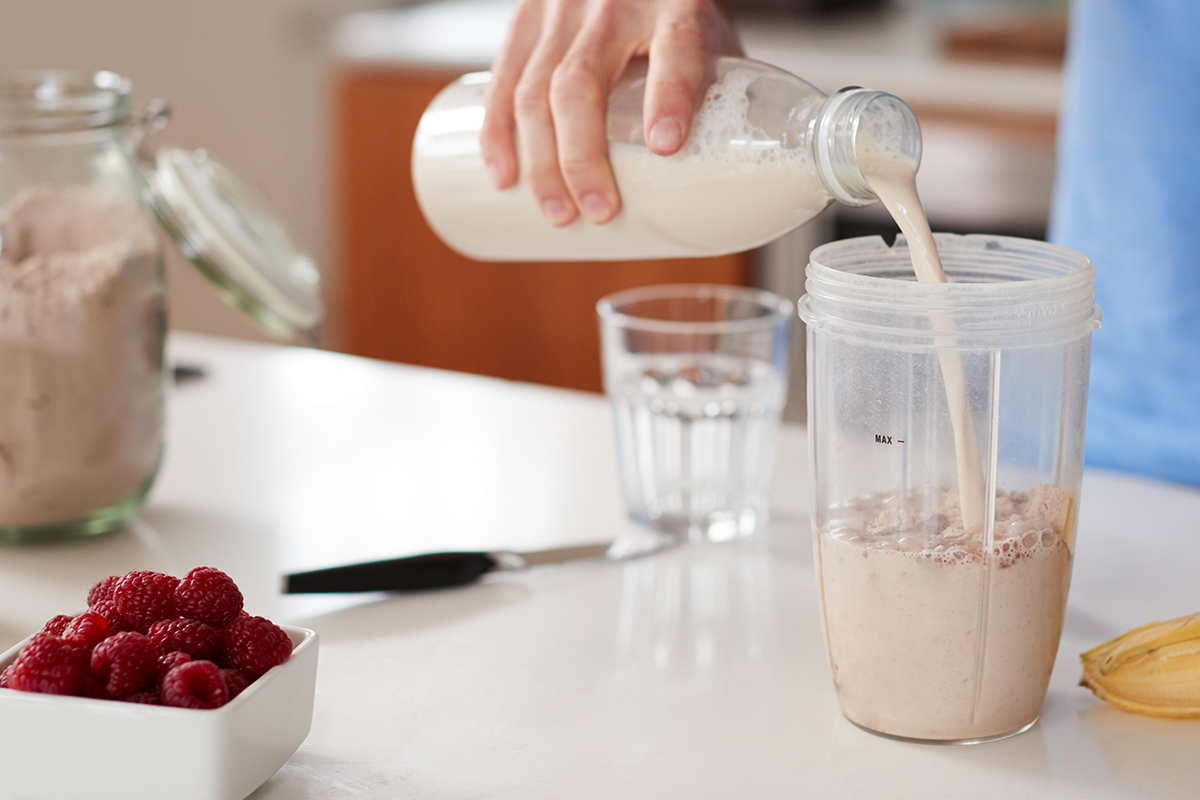
How Much Protein Does Your Body Need?
How Much Protein Do You Need Every Day?
This is a popular question that often comes from people trying to bulk or maintain muscle mass, and even from people just looking to keep their bodies healthy. In general, if you are at a healthy weight and your exercise habits are minimal, your protein intake should sit somewhere in the range of 0.36–0.6 grams per pound (0.8–1.3 grams per kilogram).1 The lower end of this range is considered the Recommended Dietary Allowance (RDA), or the amount needed to meet a person’s basic nutritional needs. For men, this is approximately 56-91 grams per day; for women, it’s about 46-75 grams per day.1 However, you can calculate a more accurate number for your individual needs.
Despite the fact that we have some guidelines on how to determine your protein requirements, it really isn’t an exact science. Each individual should consult with a specialist to determine what is best for their body.
Calculating Your Protein Needs
According to the recommendations above, the math behind this is quite simple. Let’s do a quick example to demonstrate how it’s done. Again, this is using the most basic protein recommendation.
If you are 130 pounds, if this is a healthy weight for you, and if your exercise habits are minimal, you would want to multiply by the lower end of the range we mentioned above (0.36 grams of protein per pound of bodyweight).
| 130lbs x 0.36g = 46.8g |
This quick calculation shows that your protein consumption should amount to approximately 47 grams of protein per day.
If you like, you can go a step further. Since protein has 4 calories per gram,2 you can multiply 47 by 4 to get the total number of calories you should consume from protein.
| 47g x 4 = 188 |
Now you know that 188 of your daily calories should come from protein.
Who Needs More Protein Than the Recommended Daily Amount?
Endurance Athletes

Endurance athletes need significantly more protein than sedentary individuals, about 0.5-0.65 grams per pound of bodyweight (1.2–1.4 grams per kilogram).1
The calculation here would follow the same process, only you would replace 0.36 with a number within the new range. Of course, the more intense your endurance workouts are, the greater this number will be. Generally, a number within the range of 0.5 to 0.65 helps endurance athletes meet their protein requirements.
Let’s do a quick example using kilograms instead of pounds.
If you took your weight in pounds, you would first need to divide your weight by 2.2 to get your weight in kilograms. Let’s use 130 pounds again to demonstrate how this works:
| 130 ÷ 2.2 = 59.09 |
Next, multiply your weight in kilograms by a number within the new range. Keep in mind that this range changed too. It’s 0.5-0.65 grams of protein per pound, but 1.2-1.4 grams of protein per kilogram. Let’s use the lower end of the range which is 1.2.
| 59.09 x 1.2 = 70.91 |
This calculation shows that, if you are an endurance athlete, your minimum protein consumption should amount to approximately 71 grams of protein per day.
Strength Training Athletes

Athletes looking to increase muscle mass are advised to consume at least 0.55 and up to 0.91 grams of protein per pound of bodyweight (1.21-2.0 grams per kilogram).3 Athletes who strength train regularly (and at an intense level) need just a little bit more. The recommendation is at least 0.68 and up to 0.91 grams of protein per pound of bodyweight (1.5 to 2.0 grams per kilogram) every day.3
Older Adults

Older adults have increased protein needs as well, about 0.45–0.6 grams per pound of bodyweight (1–1.3 grams per kilogram).1 According to our registered dietitian, the increased intake recommendation is partly to help maintain lean mass and partly to compensate for a slightly diminished ability to digest and absorb protein.2 Healthline explains that increasing protein can also help prevent osteoporosis in older adults.1
People Recovering from Traumatic Injuries

People recovering from serious injuries may also need more protein. The assumption is that, because traumatic injury induces hypermetabolism, protein requirements increase.4 While more work needs to be done to develop accurate energy requirements, some suggest that about 0.68 grams of protein per pound of bodyweight (1.5 grams per kilogram) is an appropriate amount.4
Pregnant Women

A 2015 study found that the recommended protein intake for pregnant women is in fact lower than previously thought. Still, the overall amount is similar to the needs of a high performing endurance athlete! According to this study, these are the appropriate amounts of protein for the average pregnant woman:
During Early Pregnancy – 0.55 grams of protein per pound of bodyweight (1.22 grams per kilogram).
During Late Pregnancy – 0.69 grams of protein per pound of bodyweight (1.52 grams per kilogram).
Is There Such a Thing as Too Much Protein?
The short answer is yes. According to a review from the International Journal of Sport Nutrition and Exercise Metabolism, the maximum safe protein intake is 1.14 grams of protein per pound of bodyweight, or 2.5 grams of protein per kilogram.2
Medical News Today identifies the following symptoms associated with too much protein:
- intestinal discomfort and indigestion
- dehydration
- unexplained exhaustion
- nausea
- irritability
- headache
- diarrhea
How do you reach and manage your protein intake goals? Share your ideas in the comments below! To stay in-the-know on trending health and nutrition topics, subscribe to our newsletter to receive monthly highlights from the Living Healthy Blog.
This article should not replace any medical or nutritional recommendations from your primary care physician. Before starting any exercise program or diet, make sure it is approved by your doctor.
Sources
- Gunnars, Kris. “Protein Intake – How Much Protein Should You Eat Per Day?” Healthline, Healthline Media, 5 July 2018, https://www.healthline.com/nutrition/how-much-protein-per-day
- James, Debbie. “Protein Percentages for Seniors: Q+A.” Living Healthy, 30 Jan. 2020, http://bloglafitness.azurewebsites.net/2017/07/18/protein-percentages-for-seniors-qa/
- Coleman, Erin. “How Much Protein Do You Need When Lifting Weights?” Healthfully, 24 Dec. 2019, https://healthfully.com/393951-how-much-protein-do-you-need-when-lifting-weights.html
- Frankenfield, David. “Energy Expenditure and Protein Requirements after Traumatic Injury.” Nutrition in Clinical Practice : Official Publication of the American Society for Parenteral and Enteral Nutrition, U.S. National Library of Medicine, Oct. 2006, https://www.ncbi.nlm.nih.gov/pubmed/16998142















